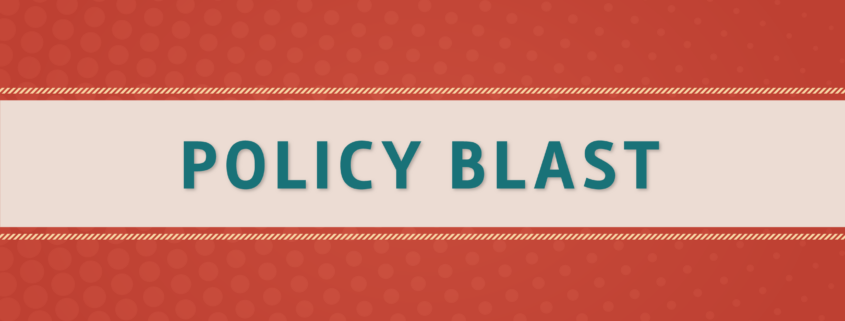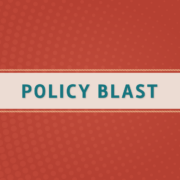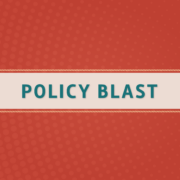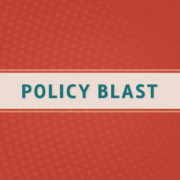Policy Blast: President Biden Highlights Urban Native Americans in Executive Order on MMIP and in Tribal Nations Progress Report
NCUIH advocacy was critical to the inclusion of Urban Indian Organizations and urban Native Americans in these Administrative efforts.
On November 15, 2021, President Biden signed Executive Order 14053 (E.O.) on Improving Public Safety and Criminal Justice for Native Americans and Addressing the Crisis of Missing and Murdered Indigenous People (MMIP) during the White House Tribal Nations Summit. Also on the same day, President Biden released a Progress Report highlighting the Administration’s commitment to address the needs of Indian Country and included a special section on “Urban Native Americans”. The Administration also mentioned the priority of ensuring 100% FMAP. Advocacy by the National Council of Urban Indian Health (NCUIH) was critical to urban Natives being prioritized by the White House and our work had a significant impact on Urban Indian Organizations (UIOs) being included in the E.O and the Progress Report.
NCUIH is pleased to see that the E.O. specifically mentions the Department of Health and Human Services (HHS) and the Secretary of the Interior conferring with UIOs on developing a comprehensive plan to support initiatives related to MMIP. NCUIH has been working on an urban confer bill, the Urban Indian Health Confer Act (H.R. 5221), that recently passed the House (406-17) with overwhelming support. NCUIH is pleased to see that the E.O. specifically mentions the Department of Health and Human Services (HHS) and the Secretary of the Interior conferring with UIOs on developing a comprehensive plan to support initiatives related to MMIP. We are also pleased to see that the E.O. highlights the need for improved data surrounding this crisis as it relates to urban Indian communities. NCUIH has voiced the importance of gathering more data on these communities, specifically on Missing and Murdered Indigenous Women. On July 2, 2021, NCUIH submitted comments to the Department of Justice on Savannah’s Act requesting UIOs and urban Indians to be incorporated into improving data relevancy, access, and resources.
The Progress Report, released by the White House ahead of the Tribal Nations Summit, highlights the Administration’s commitment to address the needs of Indian Country, including the needs of the 70% American Indians/Alaska Natives (AI/ANs) living in urban areas. NCUIH has emphasized that 70% of AI/ANs reside in urban areas and rely on UIOs to provide them with culturally competent health care. NCUIH is pleased to see that the Progress Report highlights the Administration’s commitment to ensuring UIOs receive 100% Federal Medicaid Assistance Percentage (FMAP) and include urban Indian issues within the context of public safety and justice. Over this past year, NCUIH advocacy has secured 2 years of 100% FMAP for UIOs in the American Rescue Plan Act, and the House recently passed the Build Back Better Act which includes an additional 8 fiscal quarters of 100% FMAP for UIOs.
Executive Order
The E.O. includes the following for American Indian and Alaska Natives living in urban areas and the role of UIOs in addressing these issues:
- Given that approximately 70 percent of American Indian and Alaska Natives live in urban areas and part of this epidemic of violence is against Native American people in urban areas, we must continue that work on Tribal lands but also build on existing strategies to identify solutions directed toward the particular needs of urban Native Americans.
- Earlier this year, the Secretary of the Interior and the Attorney General announced a Joint Commission, established pursuant to the Not Invisible Act, that includes: representatives of Tribal, State, and local law enforcement; Tribal judges; Native American survivors of human trafficking; health care and mental health practitioners who have experience working with Native American survivors of human trafficking and sexual assault; Urban Indian Organizations focused on violence against women and children; and family members of missing or murdered indigenous people.
- The Federal Government must prioritize addressing this issue and its underlying causes, commit the resources needed to tackle the high rates of violent crime that Native Americans experience over the long term, coordinate and provide resources to collect and analyze data, and work closely with Tribal leaders and community members, Urban Indian Organizations, and other interested parties to support prevention and intervention efforts that will make a meaningful and lasting difference on the ground.
- 4. Improving Data Collection, Analysis, and Information Sharing.
- (a) The Attorney General, in coordination with the Secretary of the Interior and the Secretary of Health and Human Services (HHS), as appropriate, shall sustain efforts to improve data collection and information-sharing practices, conduct outreach and training, and promote accurate and timely access to information services regarding crimes or threats against Native Americans, including in urban areas, such as through the National Crime Information Center, the Next Generation Identification system, and the National Violent Death Reporting System, as appropriate and consistent with applicable law.
- (c) The Attorney General, in coordination with the Secretary of the Interior and the Secretary of HHS, shall develop a strategy for ongoing analysis of data collected on violent crime and missing persons involving Native Americans, including in urban Indian communities, to better understand the extent and causes of this crisis. Within 240 days of the date of this order, the Attorney General, the Secretary of the Interior, and the Secretary of HHS shall report jointly to the President on the strategy they have developed to conduct and coordinate that analysis and shall identify additional resources or other support necessary to implement that strategy.
(e) The Secretary of HHS shall evaluate the adequacy of research and data collection efforts at the Centers for Disease Control and Prevention and the National Institutes of Health in accurately measuring the prevalence and effects of violence against Native Americans, especially those living in urban areas, and report to the President within 180 days of the date of this order on those findings and any planned changes to improve those research and data collection efforts.
- 5. Strengthening Prevention, Early Intervention, and Victim and Survivor Services.
- (a) The Secretary of HHS, in consultation with the Secretary of the Interior and Tribal Nations and after conferring with other agencies, researchers, and community-based organizations supporting indigenous wellbeing, including Urban Indian Organizations, as appropriate, shall develop a comprehensive plan to support prevention efforts that reduce risk factors for victimization of Native Americans and increase protective factors, including by enhancing the delivery of services for Native American victims and survivors, as well as their families and advocates.
Progress Report
The Progress Report included the following sections and features urban Indians:
- Meeting Obligations to Urban Native Americans
- According to the US Census Bureau, over 70 percent of Native Americans live in urban cities away from Tribal lands. President Biden is ensuring that the Administration supports and is giving a voice to the urban Indian population. The Administration has included Urban Indian Organizations in Tribal listening sessions on topics and issues such as health care, education, funding, housing, maternal care and voting rights, to name a few. It has also ensured that Urban Indian Health Organizations (UIHOs) receive 100 percent Federal Medical Assistance Percentages (FMAP) for Medicaid and included urban Indian issues within the context of public safety and justice. President Biden has also ensured that payments from Tribal governments to Tribal members from the CARES Act and the ARP do not count as income for purposes of Social Security Income benefits and included budget increases that will go directly to UIHO’s to provide much needed health care to the urban Indian population. And the Build Back Better Plan will provide families, especially children, with the much needed support for early childhood education and child tax credits for families – which will positively impact the urban Indian population.
- Responding to the COVID-19 Pandemic in Indian Country
- In the height of the pandemic, per capita COVID-19 infection rates for American Indians and Alaska Natives were three times higher than for all Americans. These disparities also produced higher mortality rates. To address these disparities, with the assistance of Tribal Nations, Urban Indian Organization health facilities, and Alaska Native health corporations, the Administration through the Department of Health and Human Services and Indian Health Service, implemented an effective COVID-19 plan in Indian Country and succeeded in making Native Americans the most vaccinated group in the United States.
- Investing ARP Funds to Combat COVID-19 in Indian Country
- $84 million for Urban Indian Organizations
- Improving Health Care Delivery for Native Americans Through the ARP
- The ARP required the Centers for Medicaid to provide a 100 percent federal Medicaid match to Urban Indian Health Programs, rather than limiting them to receive the regular Medicaid match rate for the state in which they are located.
- Providing Access to the Strategic National Stockpile
- President Biden signed Executive Order 14001, “A Sustainable Public Health Supply Chain,” allowing access to the Strategic National Stockpile for Tribal governments, IHS healthcare providers, and Urban Indian Organizations.
- Vaccine Distribution in Indian Country
- Working with Tribal communities and Urban Indian Organization health facilities, the IHS has administered more than 1.7 million doses to patients, health care employees, essential workers, and others in Native communities
- Initiative on Ending the HIV Epidemic
- The President’s FY 2022 budget request includes $27 million to support HIV prevention, care, and treatment services to help accelerate and strengthen the HIV response in Indian Country. HIV disproportionately affects American Indian and Alaska Native Men who have sex with Men (MSM). In 2018, 67 percent of diagnoses among American Indian and Alaska Native people were among MSM. The proposed increase for the IHS will support HIV care teams located in geographic areas of the U.S. serviced by IHS, Tribal, and Urban Indian Organization (I/T/U) facilities. Funds will scale-up clinical support programs designed to increase HIV prevention medication uptake and to meet viral suppression goals for primary antiretroviral therapy programs served by I/T/U facilities in Indian Country.
- White House Engagement with Tribal Leaders
- Community Development: Traditional Food, Subsistence, and Community Level Food and Feeding Programs; the National American Housing; Urban Indian Issues; Buy Indian Act; and Native Language Immersion Schools and Language Preservation.









Leave a Reply
Want to join the discussion?Feel free to contribute!